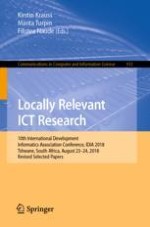2019 | Buch
Locally Relevant ICT Research
10th International Development Informatics Association Conference, IDIA 2018, Tshwane, South Africa, August 23-24, 2018, Revised Selected Papers
herausgegeben von: Kirstin Krauss, Marita Turpin, Filistea Naude
Verlag: Springer International Publishing
Buchreihe : Communications in Computer and Information Science
